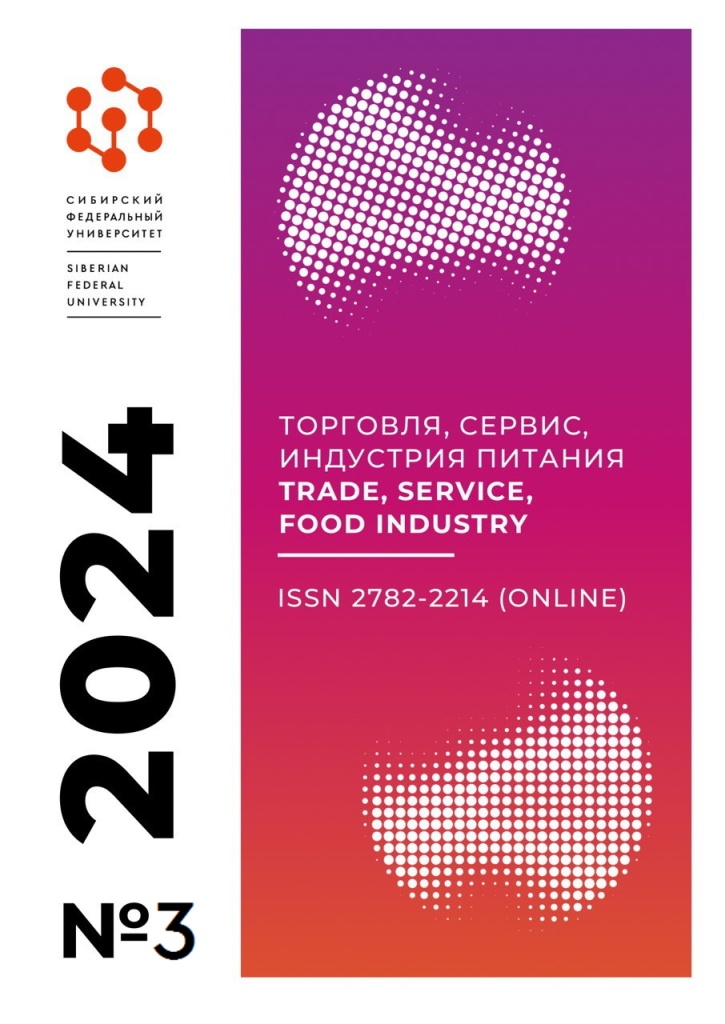Krasnoyarsk, Russian Federation
Krasnoyarsk, Russian Federation
UDC 339.137.2
The development of the competitiveness of tourism services in the digital sphere has become a key topic for discussion and research. Competition in the tourism industry is constantly growing. Companies that do not implement digital technologies risk being left behind by competitors. Digitalization of travel services brings many benefits, including increased marketing efficiency, improved customer service, expanded sales geography, optimized booking processes, and more. This allows companies to attract more customers, increase their satisfaction and loyalty, which ultimately contributes to increasing revenue and strengthening market positions. The article analyzes the performance indicators of the tourism industry in the Krasnoyarsk Territory according to the main functions of attractiveness for the client, presents an analysis in the form of an assessment of various quality factors affecting the attractiveness of a tourist destination. The calculation of the respondents' performance indicators using the expert assessment method is given.
travel services, tourism, competitiveness, travel companies, digital space of tourism
1. Avrashko, A. E., Minenkova, V. V. (2024). Features of tourism as a sector of the economy of the Krasnodar region. Scientific education, 1(22), 103–107.
2. Alexandrova, A. Yu., Nechaev, N. I. (2024). Economics of tourism. Development of problem territories. Moscow : KnoRus, 248.
3. Alexandrova, A. Yu., Zyryanov, A. I. (2024). Geography of tourism. Moscow : KnoRus, 448.
4. Beletsky, A. A., Pakhomov, V. A. (2024). Entertainment economy as a strategic vector for tourism development in the Primorsky Territory. Strategy: theory and practice, Vol. 4, Is. 1(11), 73–84.
5. Vanus, R., Pryadko, I. A. (2024). Transport complex as a component of the country’s tourism infrastructure. Bulletin of the Altai Academy of Economics and Law, 1, 11–16.
6. Voronkova, L. P. (2024). History of tourism and hospitality. Moscow : KnoRus, 396.
7. Galimova, L. I., Galimov, Sh. Sh. (2021). Sea cruises in Russia: current state and problems of development. Modern problems of service and tourism, 3, 30–38.
8. Gerashchenko, I. N. (2021). Analysis of the current state, specifics and prospects for the development of gastronomic tourism in Russia. Bulletin of the National Academy of Tourism, 4, 24–28.
9. Gruzdeva, V. V., Klyueva, Yu. S., Terekhov, A. M. (2024). Model of diversification of agriculture based on rural tourism. Modern economics: problems and solutions, 2(170), 30–41.
10. Domanova, M. E. (2024). Marketing component of intellectual tourism. Economics and entrepreneurship, 1(162), 768–771.
11. Donskova, L. I., Barannikov, A. L., Makovetsky, M. Yu. (2022). Social tourism for the youth group: main preferences and trends. Bulletin of the Russian Economic University named after G. V. Plekhanov, Vol. 19, Is. 6, 188–197.
12. Evensaper, S. V. (2022). Design of tourist routes based on GIS services. Hotel business, 4, 283–287.
13. Zholdubaeva, S. T. (2024). Assessment of the current level of tourism development in specially protected natural areas of southern Kyrgyzstan. International Journal of Humanities and Natural Sciences, 1-4(88), 99–101.
14. Zyunina, Yu. N. (2024). Mechanisms for improving interaction with the BRICS countries within the framework of the development of the tourism industry. Slavic Forum, 1(43), 148–153.
15. Ivanova, D. V. (2024). Ecological tourism as a type of environmental entrepreneurship: new in the regulation of specially protected natural areas. Civil law, 1, 38–41.
16. Lola, I. S. (2024). Business activity of tourist and sanatorium-resort organizations in Russia: trends in domestic and outbound tourism. Budget Journal, 1(253), 82–84.
17. Novikova, S. I. (2022). Formation and development of the environment of cooperative and network interactions of organizations in the service sector: dissertation for the degree of Candidate of Economic Sciences / Novikova Svetlana Ivanovna. Krasnoyarsk, 219.
18. Novikova, S. I. (2019). Assessment of the internal and competitive environment of an organization within the framework of the functional-environmental approach of cooperative network interactions by benchmarking. Creative Economics, Vol. 13, Is. 9, 1749–1766.
19. Novikova, S. I. (2019). Partner environment in the system of cooperative network interactions, methods of its assessment. Economics, Entrepreneurship and Law, Vol. 9, Is. 4, 463–480.
20. Regions of Russia. Socio-economic indicators. 2022 : statistical collection. Rosstat. Moscow, 2022, 1122. [Electronic source] URL: https://rosstat.gov.ru/storage/ mediabank/Region_Pokaz_2022.pdf (Date of access: 02.05.2024).
21. Safronova, T. N., Shitova, D. D., Khaneeva, M. A. (2023). Regional features of the development of the tourist market of the Krasnoyarsk Territory. Trade, service, food industry, Vol. 3, Is. 4, 362–372.
22. Safronova, T. N., Yakusheva, A. A., Alexandrenko, N. A. (2021). Characteristics of the current state of the hotel services market in the Krasnoyarsk Territory. // Trade, service, food industry, Vol. 1, Is. 3, 265–273.
23. Saleeva, T. V., Borisenko, E. I. (2024). Analysis of some aspects of the competitiveness of the tourism sector (on the example of the Krasnodar Territory). Professorial Journal. Series: Recreation and Tourism, 1(21), 41–47. DOIhttps://doi.org/10.18572/2686-858X-2024-21-1-41-47.
24. Shubaeva, V. G., Serdobolskaya, I. O. (2024). Marketing technologies in tourism. Moscow : Yurait, 120.
25. Fleet, A. L. (2014). Approaches to the definition and assessment of competitiveness factors in the tourism industry. Bulletin of the Leningrad State University named after A. S. Pushkin, Vol. 6, Is. 1, 28–37.
26. Fedoseeva, O. V., Firsova, P. K. (2019). Competitiveness management of tourism enterprises based on modern marketing technologies. Young scientist, 22(260), 621–624.








